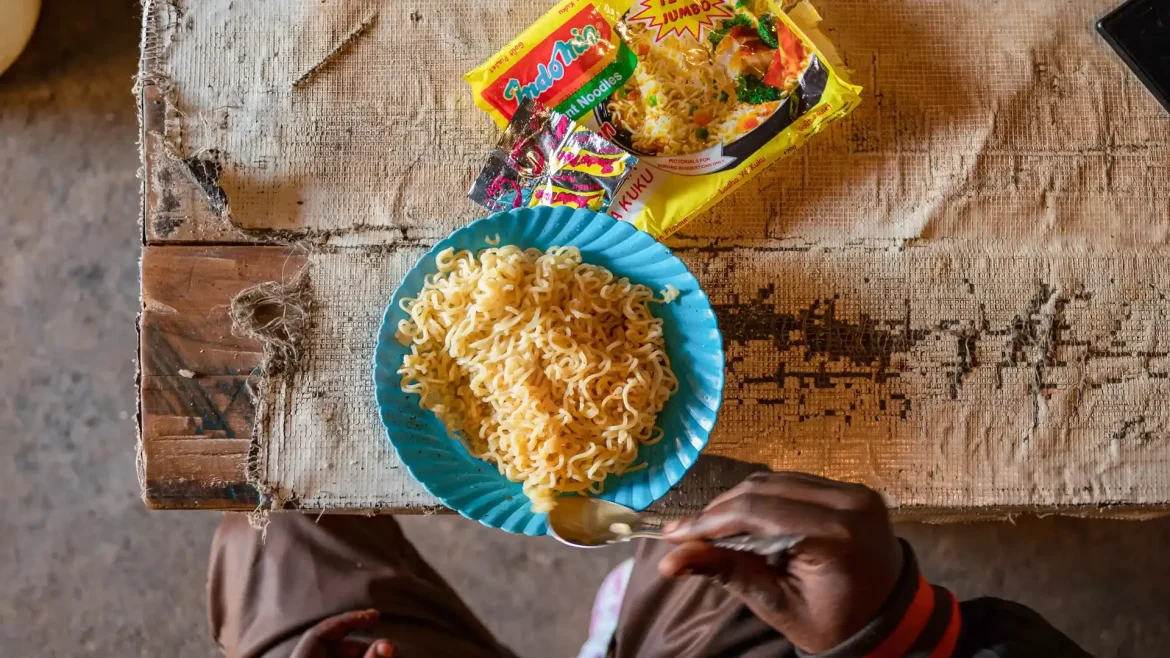How did everyone become addicted to instant noodles? Instant noodles, which are particularly well-known for their speedy preparation, have grown to be a popular and reasonably priced dinner in developing nations. Nutritionists caution, however, that the high sodium level raises worries about heart-related illnesses.
Instant noodles are becoming more and more popular in developing nations, particularly in areas like Africa, South America, and Asia where noodles were not historically consumed. Concerns regarding the growth in heart-related illnesses brought on by the usual high salt content of instant noodles accompany this trend.
The Guardian was informed by 23-year-old Remilekun Oguntoye of his daily consumption of two packs of instant noodles, which have a total of 2,352 mg of sodium, or almost 118% higher than the daily recommended amount by the World Health Organization. Oguntoye lives in a low-income neighborhood of Nigeria.
The Guardian was informed by 23-year-old Remilekun Oguntoye of his daily consumption of two packs of instant noodles, which have a total of 2,352 mg of sodium, or almost 118% higher than the daily recommended amount by the World Health Organization. Oguntoye lives in a low-income neighborhood of Nigeria.
Because of lax labeling laws, consumers who are drawn to products because of their cost, delicious flavor, and convenience frequently aren’t aware of the potential health risks. The World Instant Noodles Association reports that between 2018 and 2022, the demand for instant noodles in Nigeria—the country with the highest population in Africa—rose by 53% to 2.79 billion servings. During the same period, similar trends were seen in Kenya (160% rise), Colombia (150%), and Egypt (1100%).
Affordability and convenience have been major contributors to the continuous global increase in food consumption, particularly in times of crisis like the Covid epidemic and cost of living issues. Global consumption of instant noodles reached 121.2 billion servings in 2022, up 2.6% from the year before.
The middle class in both developed and developing countries has been more interested in Korean food due to the success of Korean pop culture, or K-pop. In the first ten months of this year, South Korea exported a record $785 million worth of instant noodles, a roughly 25% rise over the same period last year.
Instant noodles continue to grow popularity despite worries about its high salt content because of their ease of preparation and quick turnaround time, which appeals to people all over the world.
In Nigeria, the market is dominated by the Indonesian brand Indomie, which has established a unique presence in urban kitchens. Other brands, such as Maggi, owned by Nestlé and popular in India, have also attempted to enter these markets.
The Indonesian brand Indomie, which has made a distinctive appearance in urban kitchens, dominates the Nigerian market. Other companies that have made an effort to get into these areas include Nestlé-owned Maggi, which is well-known in India.
The secret to Indomie’s success in Nigeria is its marketing approach, which centers on luring in the younger demographic by establishing instant noodles as a childhood mainstay. This strategy is in contrast to Maggi’s abortive attempt to win over adults. The Y generation in Nigeria grew up on Indomie because of its two-minute cooking time, which Famakin highlights is faster than any other meal in the nation.
Food critic Opeyemi Famakin says Indomie realized what Maggi had done wrong and corrected it by focusing on kids, fostering brand loyalty from a young age. Because of the effective marketing of Indomie’s two-minute cooking time, the Y generation in Nigeria has grown up with the product. This tactic has also been quite effective in India, where the demand for instant noodles is growing quickly despite being a less developed market than China, Indonesia, and Vietnam. This is despite India’s lower consumption of the food than these other nations.
Maggi may not have taken the Nigerian market by storm, but it is a household name in India, according to Nupur Bidla, an investigator into the nutritional elements of food items and part of the Public Advocacy for Nutrition in the Public Interest (Napi) group in India. According to Bidla, “It is everywhere—in isolated alpine areas, in communities. Maggi is there, even though you might not find any veggies.”
Source:
Image: The Guardian



